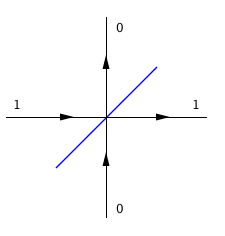
This article is part of our Information about information project, run in collaboration with FQXi. Click here to read other articles on quantum computing.
The simple answer to this question is no — within present quantum technology we are unable to build one with sufficient power to replace ordinary computers. In order to build a quantum computer you need particles that can behave like qubits, that is, the quantum analogue of the bits used by a classical computer. Qubits must be able to represent the values 0 and 1, but crucially, they must also be able to exist in a superposition of the two (see this article to find out more about how quantum computers work). The idea is to embody those qubits in particles — photons, electrons, atoms; researchers are working on a host of possibilities. And they have already succeeded in building quantum devices that use only a small number of qubits.
For an example, think of a beam splitter: a half-silvered mirror that will reflect half of a beam of light that's shone on it and let the other half pass through. Since you can think of light as consisting of particles called photons, you can ask what happens to an individual photon as it hits the surface of the half-mirror. A possible answer is that it's got a 50:50 chance of being transmitted through the mirror or reflected — either one or the other. But that's not actually what happens. When the photon hits the mirror it enters a superposition state of simultaneously being reflected and transmitted.

A beam splitter.
In the image on the right, think of a photon as representing a qubit in state 0 if it is travelling in the vertical direction and a qubit in state 1 if it is travelling in the horizontal direction. Similarly, write 0 if it continues along the vertical path after hitting the beam splitter and 1 if it continues along the horizontal path. The beam splitter therefore turns an input qubit that's in the state 0 or 1 into a qubit that is in superposition of 0 and 1. We won't go further into the details here, but using such beam-splitters and photons that impinge on them it's possible to build quantum gates such as the Hadamard gate We mentioned in this article.
Using a combination of just a few quantum gates, contraptions that are able to process one or two qubits, you can implement any quantum algorithm you can come up with — people have been able to prove this fact mathematically. So why can't we just bang together a few of those "universal" quantum gates to create a quantum computer that can perform tasks involving many qubits? That's exactly what happens in ordinary computing, where combinations of individual logic gates can perform all sorts of computations (see this article for an example).
There are many difficulties involved in getting particles to behave and interact in the qubit way, and especially in building systems of many qubits, which are needed to get the computing benefits. But the most important hurdle faced by quantum computing is the fact that superposition states are delicate: they can only survive for any length of time when the quantum system in which they occur is extremely well-isolated from its environment. If it isn't, then its quantum nature sort of "leaks out" and dissipates in a process called decoherence (the system becomes entangled with its environment). It happens very quickly, and all that's left are states we are used to seeing in real life. It's the difficulty in keeping quantum systems isolated that stops us from building quantum computers that can handle more than just a few qubits.
So when can we expect to have a fully-fledged, uncontroversial and practically useful quantum computer? "There are all sorts of wonderful and exotic things that people try to build quantum computers out of: defects in diamonds, electrons floating on liquid helium, superconducting qubits, and all sorts of amazingly imaginative stuff." says Jozsa. "There is very good progress in all of these things, it's getting better and better all the time. You can't say that [quantum computing] is far off because these developments don't occur incrementally. The transistor for classical computing didn't emerge gradually: one day there wasn't one, but a few weeks later it existed and computing exploded." says Jozsa. He quotes the physicist N. David Mermin, who in his lecture notes on quantum computation states that "Only a rash person would declare that there will be no useful quantum computers by the year 2050, but only a rash person would predict that there will be."
To find out more about quantum computing, read the following articles:
- How does quantum computing work?
- Quantum computing: Some (not so) gruesome details
- What can quantum computers do?
About this article

Richard Jozsa
Marianne Freiberger is Editor of Plus. She would like to thank Richard Jozsa, Leigh Trapnell Professor of Quantum Physics at the University of Cambridge, for his extremely helpful, very patient and generally invaluable explanations.